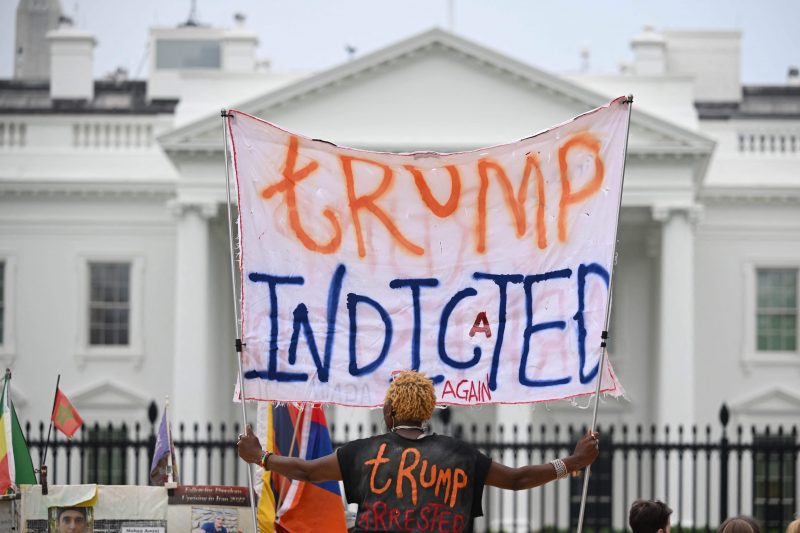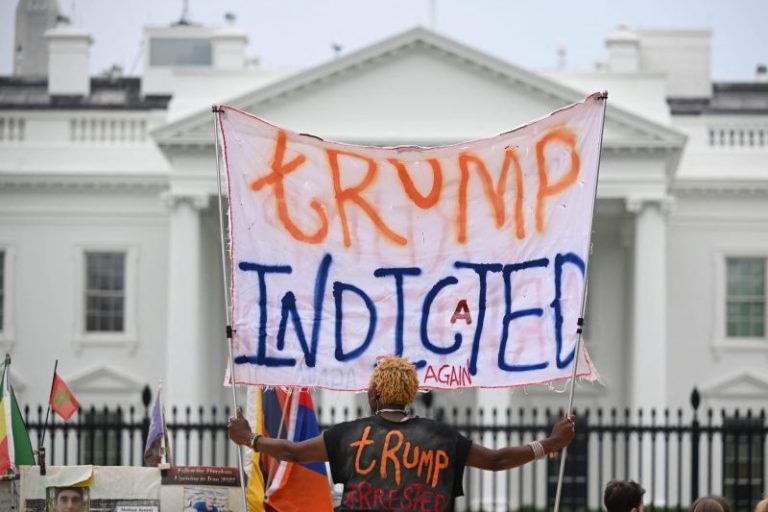
The indictment handed up by a federal grand jury against former president Donald Trump was unsealed Friday afternoon. It is a staggering document, one that outlines a remarkable (though, of course, as-yet unproven) set of allegations in general, much less the targeting of a former chief executive.
But of all of the new revelations — that documents were stored on the stage in a ballroom at his Mar-a-Lago event center, that once a staffer came across a box with secret documents spilled on the floor — there’s one that most clearly distills how reckless Trump’s behavior appears to have been and how seemingly dishonest he was when the documents investigation began.
Days after the FBI searched Mar-a-Lago for documents it believed (correctly) were in Trump’s possession, The Washington Post reported that the bureau was seeking “classified documents relating to nuclear weapons,” among other things. It was an eyebrow-raising development. While “classified document” carries a certain easily understood weight, “nuclear secrets” is much more obviously fraught.
In short order, Trump denied the report.
“Nuclear weapons issue is a Hoax,” he wrote on the social media platform he owns, “just like Russia, Russia, Russia was a Hoax, two Impeachments were a Hoax, the Mueller investigation was a Hoax, and much more. Same sleazy people involved.”
Less than a week later, after a redacted version of the affidavit used to obtain the search warrant was made public, Trump used the affidavit to elevate the same claim.
“Nothing mentioned on ‘Nuclear,’ a total public relations subterfuge by the FBI & DOJ,” he wrote, “or our close working relationship regarding document turnover — WE GAVE THEM MUCH.”
This was a layup for Trump from a public-relations perspective. With an investigation underway, the FBI and the Justice Department weren’t likely to confirm that Trump had nuclear documents in his possession. And the response to The Post’s initial report from Trump’s critics was often breathless, given the understood severity of the situation should it be confirmed. It was seen by Trump supporters as another left-wing overreach, exactly in keeping with how they had learned to view the Russia probe.
That’s where it sat. Over time and without further confirmation, the idea that Trump had documents related to nuclear weapons fell into the liminal space in which so many political issues sit: denied vociferously by Trump and his allies as they remained unproven.
On Friday, though, the indictment was made public.
“The classified documents TRUMP stored in his boxes,” it read near the beginning, “included information regarding defense and weapons capabilities of both the United States and foreign countries; United States nuclear programs; potential vulnerabilities of the United States and its allies to military attack; and plans for possible retaliation in response to a foreign attack.”
Trump was indicted on 31 counts of “willful retention of national defense information,” each count pegged to a specific document in his possession. More than one dealt with nuclear secrets.
Those are documents the FBI seized when it searched Mar-a-Lago on Aug. 8, 2022. It’s not clear where they were being stored; about a quarter of the documents the bureau recovered that day were found in Trump’s office and not in the downstairs room where most of the boxes were stored. Those included about half of the documents marked as “top secret.”
It is almost certain that Trump and his attorneys will claim that he wasn’t aware some of these documents were in his possession, despite evidence presented in the indictment that he himself was sorting material before some of it was returned to the National Archives and Records Administration. This claim of ignorance might also be deployed as a defense against his having made the apparently untrue claim that he was not in possession of any nuclear secrets.
Trump should, like any criminal defendant, be presumed innocent of the charges brought by the government. The government’s indictment alone does not prove its case.
That said, there is no reason to grant Trump the benefit of the doubt here. His statements are by no means more credible than the allegations included in the indictment.
The strong suggestion, then, is that Trump did, in fact, have a cache of classified documents, including ones concerning nuclear weapons, stored in various places around Mar-a-Lago, his home — and also an event space.
“Between January 2021 and August 2022,” the indictment states, “The Mar-a-Lago Club hosted more than 150 social events, including weddings, movie premieres, and fundraisers that together drew tens of thousands of guests.”
This is part of why The Post’s initial report sparked outrage in the first place.


Comments are closed.